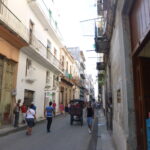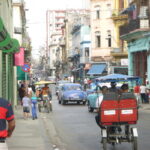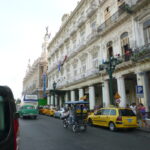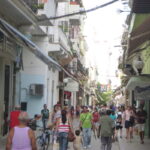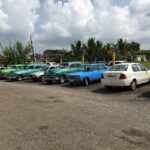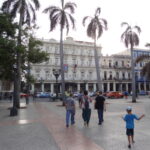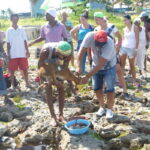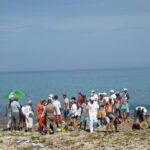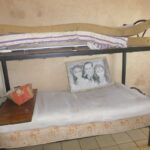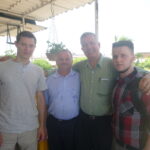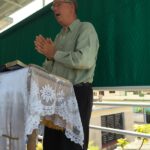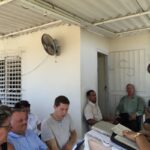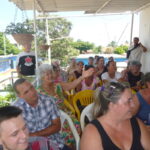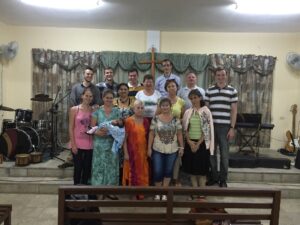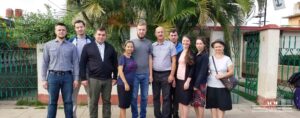Dear friends, God gave us an opportunity to visit the Republic of Cuba and we would like to share our experience with you. This country has been controlled by the communist government since 1965. In 1960, commercial, economic and financial embargo was imposed by the United States on Cuba. Recent easing of tensions between the United States and Cuba offers us a great opportunity to spread the Gospel and help Cuban seekers to receive Bibles and other possible help.
After making our first trip to Cuba, we would like to continue helping people who live in this country, provide information to you and ask for your contribution. “For God loves a cheerful giver” Corinthians 9:7.
While being in Cuba, visiting churches and meeting people, we were asked for help with Bibles, medications, humanitarian aid and financial support for church needs.
If after reading this information your heart will be open to donate for needs of Cuban people, please click here or visit Donate page. With your contributions and God’s blessings, we believe we can make a difference by helping people accept Jesus Christ as their personal Savior. All of your contributions are tax deductible. No part of the organization’s income is distributed to its members or directors.
After making our first trip to Cuba, we would like to continue helping people who live in this country, provide information to you and ask for your contribution. “For God loves a cheerful giver” Corinthians 9:7.
While being in Cuba, visiting churches and meeting people, we were asked for help with Bibles, medications, humanitarian aid and financial support for church needs.
If after reading this information your heart will be open to donate for needs of Cuban people, please click here or visit Donate page. With your contributions and God’s blessings, we believe we can make a difference by helping people accept Jesus Christ as their personal Savior. All of your contributions are tax deductible. No part of the organization’s income is distributed to its members or directors.
Making our first trip to Cuba was a new experience to us as we did not know anyone who lives in Cuba. But our desire was to visit the country, meet people and to spread the Gospel. God sees our desires and He helped us with our trip. We got to know Christian people who live in Cuba prior coming to country. They met us in the airport and helped us with many things while we were traveling in Cuba. Our trip was for seven days and we were able to visit local churches, see their lifestyle and their needs.
Cuban families live in poverty, they use a system of food distribution known in Cuba as the Libreta de Abastecimiento (“Supplies booklet”). This system establishes the rations each person is allowed to purchase. The “supplies booklet” when used at a ration shop provides families with a minimal amount of rice, sugar, matches and oil. The average monthly income for a family in Cuba is approximately $20-$30. To put this in perspective, a new bicycle costs about $100, in order to purchase this bicycle, we can imagine how long they have to work. Cuban water quality is bad and as a result, residents receive water that is not safe to drink. Some parts of the country can go without water for as much as 20 days. Some residents have to receive water in tanker trucks which are brought twice a week.
While being in Cuba, we were able to visit three churches. Two of those churches are Cuban Baptist churches and one was a Russian church. While visiting these churches, we were asked for help with Bibles, humanitarian aid and financial support. One of the churches we visited in San Antonio de los Banos is in need of financial support in order to finish their church building. They would like to install a glass door in order to protect visitors from tropical rains during church service. They would also like to install fans in their church to be used during worship services as their average summer temperature is about 95 F with high humidity. Their church bought a tractor to transport their members and other visitors to their church service but the tractor still requires a trailer, new tires and a battery. (you can see the tractor on the pictures to the right)
Another church is asking for humanitarian aid and medication help. We were asked for medication such as Advil, which they use for people who are having cancer pain.
While making our first visit to Cuba, we were able to bring a few Bibles with us that we happily gave out. We also brought some Christian tracts and audio CD’s about God and Jesus Christ we shared with people we met.
Here is a little background on religions and churches of Cuba: Cuba is a multiracial society with a population consisting of people from mainly Spanish and African origins. The largest organized religion is the Roman Catholic Church. Afro-Cuban religions, a blend of native African religions and Roman Catholicism, is also widely practiced in Cuba.
Cuba was officially an atheist state from 1959 to 1992. In 1962, the government of Fidel Castro seized and shut down more than 400 Catholic schools, charging that they spread dangerous beliefs among the people. In 1991, however, the Communist Party lifted its prohibition against religious believers seeking membership, and a year later the constitution was amended to characterize the state as secular instead of atheist.
Religious groups were no exception to the government’s generalized efforts to monitor all civic activities, and the Communist Party’s Office of Religious Affairs monitored and regulated almost every aspect of religious life, including the power to approve or deny religious visits, the construction or repair of religious buildings, the ability to conduct religious services in public, and the importation of religious literature.
Although Cuba is considered mostly Roman Catholic, other religious faiths are allowed to practice there. Protestants are the second largest religious group in Cuba – Baptists and Pentecostals are likely the largest Protestant denominations. In response to strict restrictions on the construction of new buildings, many religious organizations used private homes, known as “house churches,” for religious services. Estimates on the total number of house churches varied significantly, from just under 2,000 to as many as 10,000. The Office of Religious Affairs allowed this but required that recognized groups seek approval for each proposed location through a separate registration process. Religious groups indicated that while many applications were approved within two to three years from the date of the application, other applications received no response or were denied. A license from the Office of Religious Affairs is necessary to import religious literature and other religious materials. The government owns nearly all printing equipment and supplies and tightly regulates printed materials, including religious literature.
While there is freedom to worship, many religions are secularized. This may be due to the historical fact that the government does not want dangerous religious beliefs permeating throughout Cuba.




